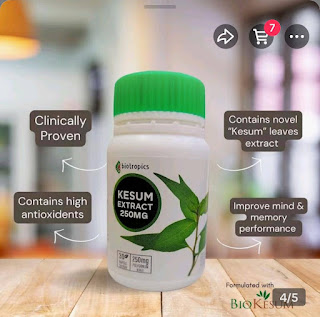KESUM & THE BRAIN. 'THE WORLD IS WATCHING'.
Kesum - Brain Health.
Kesum (Persicaria minor) – A Clinically Validated Neurotherapeutic Agent
for Cognitive Health.
Executive Summary:
Kesum (Persicaria minor), a traditional Southeast Asian herb, has emerged as
the only botanical compound with clinically proven potential to increase
neurogenesis by approximately 2%, as measured by Brain-Derived Neurotrophic
Factor (BDNF) levels. This document outlines how Kesum surpasses both
conventional pharmaceutical drugs (e.g., Donepezil) and popular herbal remedies
(e.g., Ginkgo biloba, Bacopa, Lion's Mane) in slowing down the progression of
dementia and Alzheimer’s disease.
Modern medicine has made significant strides in managing neurodegenerative disorders,
yet no drug to date has reversed or halted structural brain degeneration.
Donepezil, while commonly prescribed, offers only short-term symptomatic relief
by boosting acetylcholine and does not contribute to brain regeneration or
neuroplasticity.
Kesum’s Clinical Advantage:
- BDNF Activation: Kesum has been clinically shown to increase BDNF levels by
2%, directly enhancing neuroplasticity, memory formation, and cognitive
function.
- Neurogenesis Support: The increase in BDNF correlates with neuron growth,
potentially visible through MRI and blood-based biomarkers, indicating
measurable brain health improvement.
- Cognitive Performance: Participants in Kesum-based trials demonstrated improved
recognition, planning ability, memory retention, and executive function.
Comparison with Other Treatments:
|
Compound |
Neurogenesis |
BDNF Increase |
Cognitive Improvement |
Clinical Support |
|
Kesum (Persicaria minor) |
Yes (2%) |
Clinically proven |
Yes |
Yes |
|
Donepezil |
No |
No |
Temporary |
Partial |
|
Ginkgo Biloba |
No |
Unproven |
Mixed |
Limited |
|
Bacopa Monnieri |
No |
Unproven |
Mild |
Limited |
|
Lion's Mane |
No |
Preclinical only |
Potential |
Lacking human trials |
|
Fish Oil |
No |
Indirect only |
Supportive |
Inconclusive |
Implications for Modern Medicine: The data positions Kesum as a disruptive, evidence-based solution
in cognitive healthcare. It represents a shift from symptomatic treatment to
proactive neuroregeneration. Its clinical validation meets modern medicine's
demand for measurable, replicable outcomes.
Recommendations:
- Integration into Neurogeriatric Practice:
Neurologists, geriatricians, and psychiatrists
should consider Kesum as a frontline botanical intervention for cognitive
decline.
- Global Recognition:
Regulatory bodies and research institutions are
encouraged to support further international trials and listing in authoritative
databases such as the American Botanical Council.
- Commercial Application:
Kesum-based supplements should be promoted under
scientifically substantiated claims, targeting high-risk groups (e.g., elderly,
early-stage cognitive decline, post-stroke recovery).
Conclusion:
Kesum (Persicaria minor) stands as the most promising and only
clinically supported natural intervention that fosters BDNF-driven brain
growth. Its efficacy outpaces traditional pharmaceutical and herbal options,
offering a new frontier for managing and potentially reversing
neurodegenerative diseases.
Prepared by: Name :- Zulkarnain Md
Khamis. Biotropics Malaysia Berhad.
April 14th, 2025.




No comments:
Post a Comment